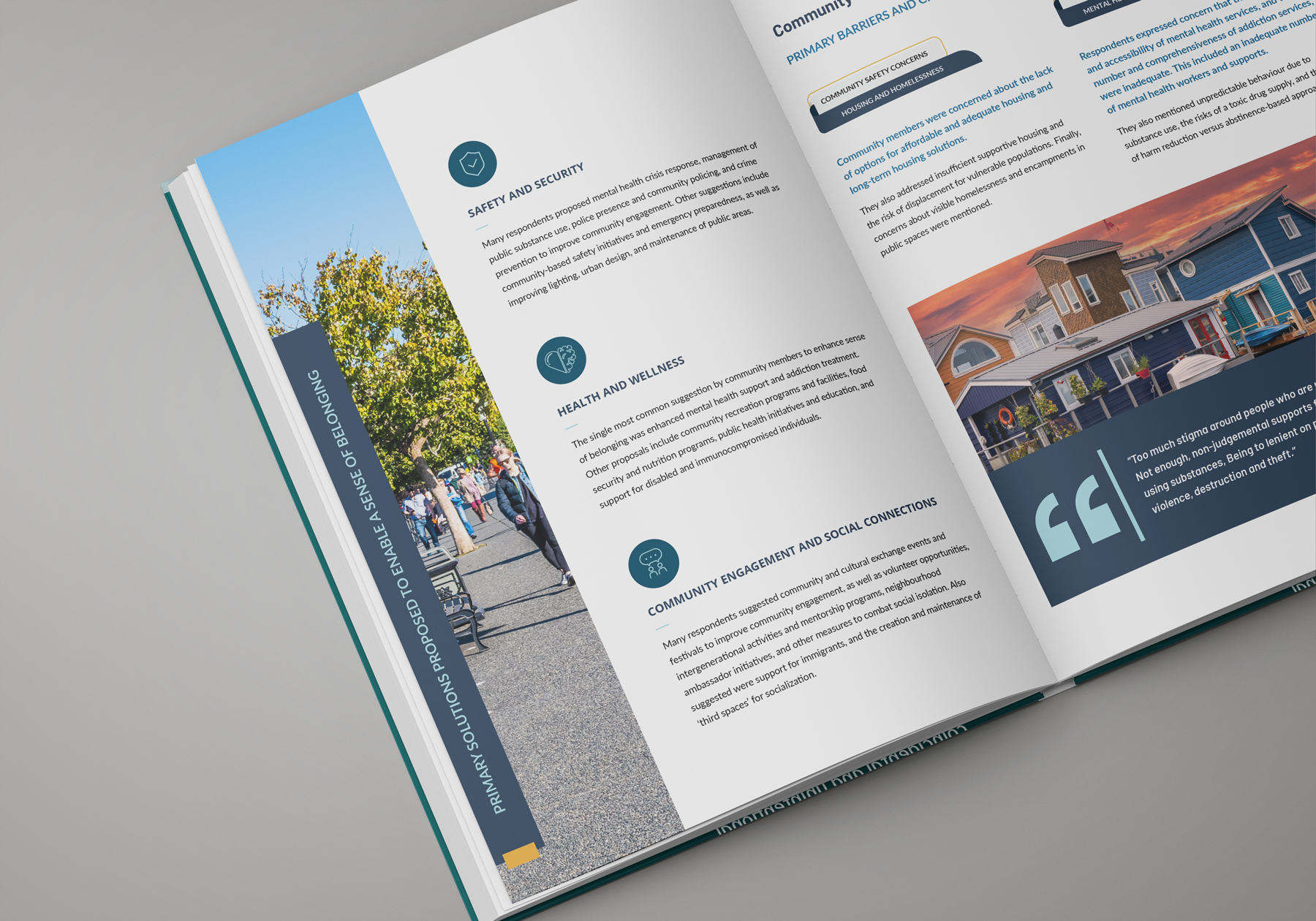
Community Safety and Wellbeing Plan
City of Victoria
The City of Victoria has undertaken a comprehensive initiative to develop a Community Safety and Wellbeing Plan, aimed at addressing complex social challenges and enhancing quality of life for all residents. To ensure an objective, data-driven approach, we contracted with HelpSeeker Technologies, a leading social data company, to analyze the extensive community feedback gathered during our consultation process. What follows is HelpSeeker’s report on their findings
Read Report
Deeply Affordable and Supportive Housing Strategy
City of Kawartha Lakes and the County of Haliburton
This Deeply Affordable and Supportive Housing (DASH) Strategy sets out a clear plan to improve access to housing for people across Kawartha Lakes and Haliburton County—especially those with the fewest options. It focuses on creating deeply affordable and supportive housing, preventing housing loss, and strengthening the systems that help people stay housed.
Read Report
Ottawa Housing Needs Assessment
City of Ottawa
Ottawa’s housing needs are shifting due to population growth, demographic change, and rising affordability pressures. These trends will challenge the city’s housing and homelessness systems in the coming decade. This Housing Needs Assessment offers a data-driven look at current and future needs, highlighting key pressures like the income–housing cost gap, growing renter demand, longer waitlists, and increased homelessness.
Read Report
Airdrie Housing Solutions Working Group Summary Report
City of Airdrie
Airdrie’s growing population presents housing opportunities, but rising costs and limited affordability challenge seniors, families, newcomers, and essential workers. The Airdrie Housing Solutions Working Group (AHSWG) develops forward-thinking, Council-endorsed strategies to address these issues. This report proposes a "Made-in-Airdrie" approach to enhance affordability, availability, and inclusivity for a sustainable housing future.
Read Report
Municipalities Under Pressure: The Human and Financial Cost of Ontario’s Homelessness Crisis
Association of Municipalities of Ontario (AMO)
Ontario is at a tipping point in its homelessness crisis. new evidence reveals the unprecedented and growing stress on individuals, families, communities, and governments. For the first time, data from Ontario’s 47 municipal service managers has been aggregated and analyzed, providing a fuller picture of the issue, along with a roadmap for the future.
Read Report
Housing Needs Assessment Starter Kit
HelpSeeker Technologies
This Starter Kit is designed as a practical resource for municipalities, community organizations, and housing advocates looking to better understand and address local housing needs. It provides a flexible approach to gathering essential data and insights supporting informed decision-making and planning.
Read Report
Urban Reawakening: Confronting the Ghosts of Vacancy
HelpSeeker Technologies
Urban development and economic transitions frequently result in vacant properties within cities, presenting significant challenges. But with housing, mental health, and social isolation crises afoot, cities across Canada face a paradox of needing to build more social infrastructure, while many buildings and lots still remain empty. This paper presents a short overview of how cities across Canada are responding to this challenge.
Read Report
Emerging Signals Alert: Seniors Home Takeovers in Canada
HelpSeeker Technologies
Seniors' home takeovers in Canada are an emerging social issue where vulnerable older adults are coerced or manipulated into allowing individuals to take over their homes, often for illicit activities. This phenomenon involves the exploitation of seniors' vulnerabilities, leading to various forms of abuse and compromising their safety, well-being, and independence in the Canadian context.
Read Report
Karto Signals: Shifting Responses to Encampments
HelpSeeker Technologies
In recent years, Canadian cities have witnessed a significant rise in the number of encampments. These spaces, often born out of necessity, have become a focal point in discussions about social infrastructure planning, social policy, and human rights. This Karto Signals briefing aims to serve as an introductory resource for social infrastructure decision-makers, offering a focused lens on four emergent signals that are set to impact the future of community wellbeing and safety.
Read Report
Karto Signals Redefining the Emergency: Integrating Disaster Responses with Complex Social Issues
Dr. Alina Turner
Examin the transformative approaches to emergency preparedness in Canada, amidst an era marked by escalating social and environmental challenges. This report delves into the integration of disaster response mechanisms with complex social issues, advocating for a holistic strategy that encompasses both prevention and response across multiple levels of government. It underscores the need for innovative, inclusive frameworks to ensure robust and equitable emergency management throughout the nation.
Read Report
2024 State of Child Wellbeing In Central Alberta
Central Alberta Child Advocacy Centre and Red Deer Polytechnic
The "State of Child Wellbeing in Central Alberta" report, prepared by the Central Alberta Child Advocacy Centre (CACAC) in partnership with Red Deer Polytechnic, provides an in-depth exploration of the current conditions affecting child wellbeing in the region. This report not only collects data on child maltreatment—including physical, emotional, and sexual abuse—but also examines the broader social, economic, and cultural contexts that influence these issues.
Read Report
Karto Signals: Child and Youth Safety and Wellbeing Post-COVID19
HelpSeeker Technologies
Karto Signals is a monthly release and virtual discussion that provides in-depth analysis and insights into emerging or pressing issues in the social infrastructure landscape. In a world where the technological landscape is evolving at an unprecedented pace, the challenges and opportunities facing today's children youth are both complex and urgent. This Karto Signals briefing aims to serve as an introductory resource for social infrastructure decision-makers, offering a focused lens on four emergent signals that are set to impact the future of community wellbeing and safety.
Read Report











